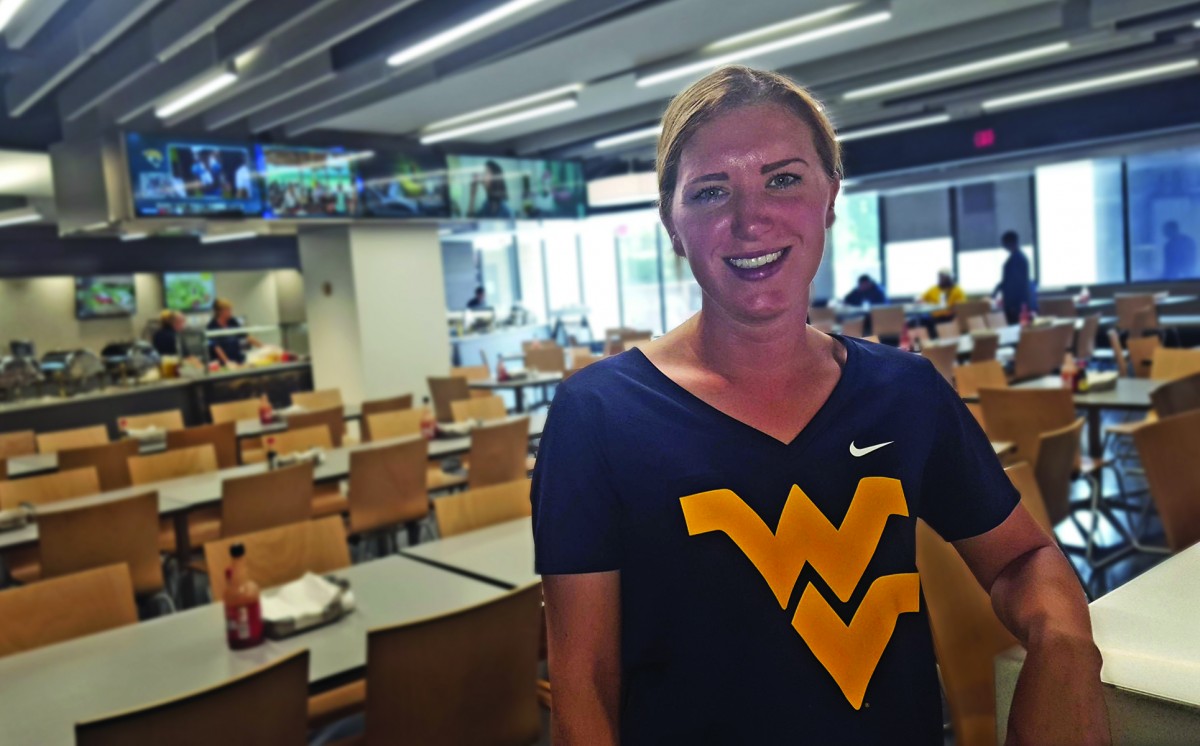MORGANTOWN — For a month, Texas transplant Taylor Lile lived out of a local hotel while awaiting her furnishings to arrive. More accurately, she slept at the hotel. She lived at the Milan Puskar Center inside the football stadium’s south end.
Charged with running West Virginia’s newly renovated dining hall, and overseeing every aspect of the football team’s nutrition, Lile has become a fixture at coaches meetings, lifting sessions and practices. The first football-only dietician in the Big 12 (and the fifth in the FBS), her imprint marks four team meals daily during preseason camp. It’s a farm-to-fork job that begins with menu planning and ends with actually grading the food players stack upon their plates.
“She might tell you to go get some fruit or maybe you need a little more protein,” said receiver David Sills, whose plates typically grade out near the high end on Lile’s 1-to-4 scale. “Taylor has been very interactive with all of us. She even has different plans for us individually. You can tell how much she cares.”
WVU head coach Dana Holgorsen cared enough to seek out a nutrition director after the NCAA relaxed rules on schools feeding players. Food intake — at the proper volume and appropriate intervals — can expedite muscle recovery and spike performance. Holgorsen affords Lile the authority to force-feed players amid the rigors of camp, when some guys drop 12 pounds over a practice.
“Taylor will sit with them and say, “Eat this, and you aren’t moving until you eat it,’ ” Holgorsen said. “It’s like growing up as a kid, when if you don’t eat your peas, then you have to sit there until you eat your peas.
“I remember days of when kids would fall out at practice. I’d be like, ‘What’s wrong with you?’ They’re like, ‘I’m starving.’ They’d rush from class, and they’d get over here and go into meetings, then go outside and practice, and they’d fall out because there’s nothing in their system.”
A University of Oklahoma graduate, Lile interned at her alma mater and Clemson. That preceded stints at the University of Oregon and a foray into professional sports with the Dallas Cowboys and the NBA’s G-League Texas Legends.
Despite WVU having to remodel around the old bones of the Milan Puskar building, Lile said the dining hall now ranks “probably top 10” in the country. There’s an omelet station at breakfast. A pasta bar beckons for lunch and dinner. Roll-top steamers reveal chicken breasts and beef roast, and the grill fires up for steaks and burgers. Along with a soup, salad and sandwich stations, bins of fresh fruit line the exit.
Lile points toward a oversized coolers filled with bottled water and Gatorade.
“We’re trying to prevent cramping and we’re trying to get ahead of heavy sweaters,” she said. “We do turn off the Coke machines during the day, because we want to promote good hydration, but we allow it at dinner.”
Some staffers tease her for being a stickler, but Lile crafts realistic expectations for college athletes.
“If you’ve done well all day with eating healthy — making sure you’re getting whole grains, lean proteins and veggies — then you can have that piece of cake or allow for that trip to Five Guys,” she said.
Those exceptions are rare, though. After all, these meals are as much about chemistry as they are calories. During camp at least, players dine together instead of grabbing to-go boxes.
“Some people used to just go home and eat, but now everybody’s here eating as a team and it’s big for building cohesiveness,” said junior linebacker David Long. “The food’s better. Tay-Tay, she’s making things happen.”
Growing up in Wichita Falls, Texas, Lile played soccer before competing in AAU volleyball and basketball. When team bus rides featured fast-food stops, Lile instead ate the meals her mom packed — lean proteins and apple slices with peanut butter.
“I grew up with a health-conscious family, and I saw how my body composition changed and how my performance was better,” she said. Soon a career in sports nutrition was born, with Lile realizing, “I just want to help someone perform better.”
To that end, she hired an executive chef from the U.S. Olympic training center in Colorado Springs. Together they’ll plan menus featuring fresh ingredients meant to energize and fortify 100-plus football players. Some dishes will be gobbled up, while others will require some coaxing.
“We had brussel sprouts Saturday night,” LIle said. “I can eat them shredded on salads but I really don’t like them cooked. Still, I have to try it before the players and the coaches do, so I’ll always be the first critic.”




